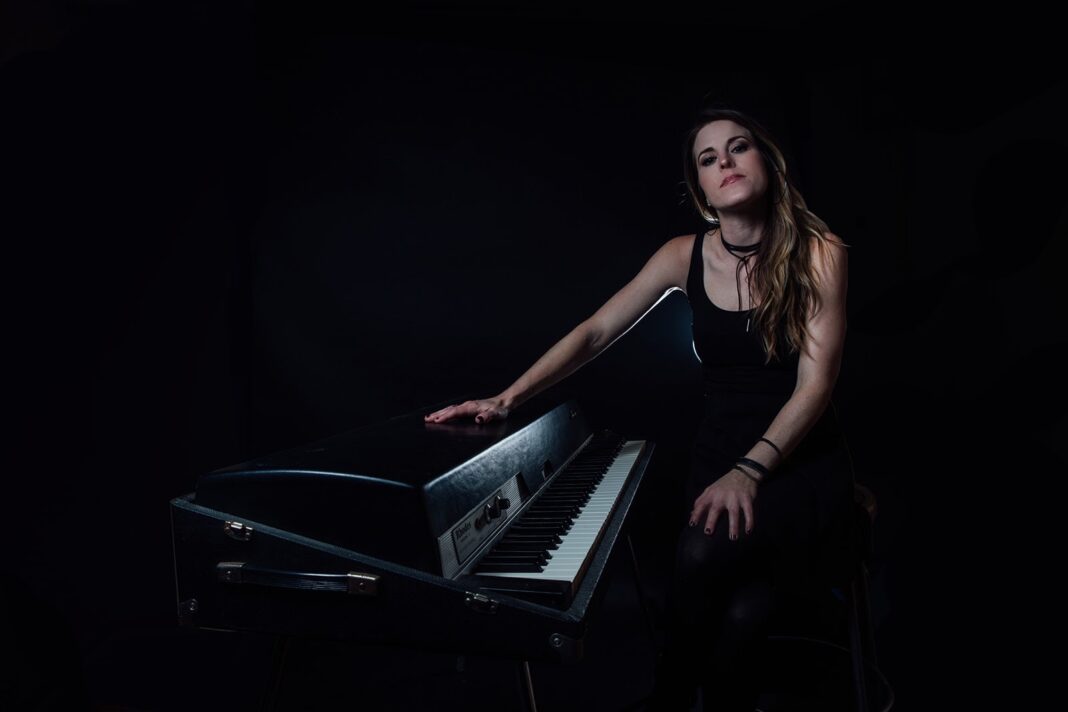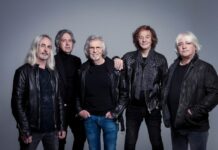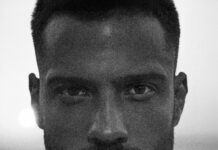Chicago singer and songwriter, Leslie Hunt, is anything but your typical vocalist. At 25-years old, Hunt appeared on Season 6 of American Idol, making it to the Top 20. Since leaving the show, she has gone on to captivate millions of people with her music, recording three amazing solo albums, and eventually becoming the lead singer of the progressive rock band District 97, releasing four studio albums and several live albums.
Throughout her career, Hunt has worked with numerous established talents, including drummer Vinnie Colaiuta (Frank Zappia, Joni Mitchell, and Sting), bassist Vail Johnson (Stevie Nicks and Herbie Hancock), and Chicago Symphony Orchestra’s cellist Katinka Klein.
Hunt comes from a family of musicians, where music, as she describes, is a very large part of her database. With her parents in a band, all these different facets of music and performance surrounded her as a child, eventually starting with musical theater as a kid. “At 10-years-old, I was involved with professional theater, for shows like Music Man , or a nine-month run of doing six shows a week.”
Hunt, who is releasing the first EP, Ascend, on June 25 through Spirit of Unicorn Music, an affiliation of Cherry Red Records, is already preparing for her next EP release Descend, which is being released in September, making the highly anticipated solo double EPs her best work yet. Promising her fans an early taste of Ascend, Hunt is releasing a music video for “Right Here” prior to the release and has already shared an acoustic video of her song “Wolf Cried Boy”.
As a solo artist, Hunt holds regular performances, enchanting rooms large and small with nothing but a piano and her voice. She also has a full backing band for shows that are less intimate, yet still wholly riveting.
But what many may not know, is that Hunt is a survivor on all accounts. Since she was seven years old, she has been living with Lupus, while battling an eating disorder as a teenager and young adult, and losing her sister to a drug overdose.
Although life has thrown some pretty harsh realities her way, Hunt continues to win the fight through her compelling and powerful music, utilizing her multi-talents and adversity to affect fans all over the globe.
True Hollywood Talk sat down with Hunt in an immersive and revealing interview.
“I was quite ill as a child,” she told True Hollywood Talk, “and I think that did contribute to my obsessive-like craft of sitting in front of the mirror, and practicing the same song over and over again, until I had it down. I also started taking piano lessons at the age of four.”
At seven years old, Hunt was diagnosed with Lupus disease, where she was unable to be outside in the sun. “I’ve been very healthy as an adult, but as a kid, I could never go outside, so I would just sit in my room and perform by myself.” This, according to the artist, transitioned into Hunt writing songs that really changed her world around her. Realizing she loved to write, Hunt at around third-grade, began putting her originally written songs in a journal.
After writing six original songs, she recorded a demo of them, and began selling them out of her high school locker. Little did she know that Survivor’s founding member, Jim Peterik, would come across her work.
“Jim Peterik got my tape through Bob Destocki, my high school theater’s manager and former manager of The Eagles, and then he began mentoring me as a songwriter on a regular basis. Well over half of my life I’ve been in Peterik’s camp, working with him on a variety of projects and singing many of his songs. He got me a development deal with Sony, and while it didn’t work out at the time, I’ve been writing and releasing songs ever since in and around the Chicago music scene.”
Peterik, also a founding member of the Chicago-based rock band The Ides of March, spoke with True Hollywood Talk back in August 2019 after the release of the band’s 55th anniversary album, “Play On”, and how the world’s longest-performing rock band still had all its original members, including Peterik (lead vocals, lead guitar, piano), Larry Millas (guitar, bass, and vocals), Bob Bergland (bass, saxophone, and vocals), and Mike Borch (drums and vocals).
In working with Peterik, he referred Hunt to Hollywood actress Laura Orrico to assist Orrico with voice coaching for a side project. Orrico, who is the CEO and President of Laura Orrico PR, which several months after hiring Hunt as her voice coach, Hunt then hired Orrico’s firm to represent her for publicity.
The industry, according to Hunt, has certainly changed. In explaining this, she began with the fact that she herself has changed, describing herself as “a lot more introspective” when she first started her career. “I was pretty much exclusively singing and sitting at a piano…which at a younger age, being into emo, everything seemed to make [a person] cry. I was processing a lot of familial trauma and my sister who was battling addiction. I had a lot of material.”
Before the Explosion of Social Media
Prior to American Idol, Hunt, like many her age, was immersed in the more “emo” type of music, which she described as “everything making you cry, otherwise it was trash.” With her sister at the time battling addiction. Hunt was struggling with family trauma, and simultaneously had a lot of material to work with.
With the evolution of Idol over the years, the level of exposure for contestants has also grown. Hunt, 38, didn’t join the world of social media until 2008, a year after joining the show, who was basically forced into the realm of social media.
Around that time, Myspace was still prevalent on the Internet, with some previous traces of its predecessor, Xanga, still hanging around. Xanga, the “Wordpress 1.0” of social media, was simply a blog where the most interactivity a user could have was embedding a song in the background anytime someone visited your page. There were no buddy lists, no “walls”, no direct messaging. And then, MySpace came about, introducing the internet to the first real “interactive” social media platform, with the “Top 8” friends list. From there, social media was truly born.
With the world at the time still trying to wrap its head around the meaning of “social media”, Hunt was learning how to balance her “national” fame with the rules of social media. “To hear that the world is online, and then be told, ‘don’t look yourself up’, or don’t look up what people are saying about you, it’s hard not to. Of course I looked myself up. Some of it was great, but some of it, I’ll never forget, wasn’t.”
But what many outside the show didn’t know was that Idol limited contestants to strictly their voices; the reality show did not allow for contestants to perform with instruments until November 2007, a season after Hunt’s appearance.
“The Hollywood round of American Idol 7‘s audition process begins this week, and for the first time in the show’s history, contestants will be allowed to play instruments when they sing,” one news article stated.
“We knew Chris Daughtry, Carrie [Underwood] and Bo [Bice] could play the guitar but we really couldn’t show it. If [the contestants] can play an instrument this year we want to be able to see that, and we’ll introduce a couple of days of that during Hollywood week,” executive producer Nigel Lythgoe told the New York Post.
But what did people want to hear at the time? That was a difficult question to answer for many breaking into the industry.
“Wondering what people wanted to see at that time and age, I had to choose between singing well and looking good,” Hunt explained. “So, I could lip-sync and move my body. I really had to think about it. But today, I’ve certainly changed, now performing for larger audiences for the past 13-years.”

“It was really cool to go up against that many people and see the contestants go from 104,000 people to 20,” she told us. “With every round that goes by, you’re just like, all right, now you just have to rally and look around you. You’re like, what am I bringing to the table that these guys aren’t? It was a great experience and an incredibly brutal mirror to look into, and especially before the explosion of social media.”
But Hunt didn’t walk away empty-handed, crediting the Idol judges with some great tips. “I think the judges, each, in their individual capacities, gave me some great business feedback, which I really do believe in and have benefited from to this day. It was a great experience.”
Now, as a performer, Hunt is very dynamic and says it’s almost harder for her to sing standing still, embracing more upbeat rhythms. “It’s not all sad material anymore,” she emphasized.
In performing for thousands of people, Hunt still loves looking out into the audience and watching the facial expressions of those immersed in song. “It’s interesting watching their faces,” Hunt said, “because they don’t know you can see them, as they are singing to the very lyrics you have written. The stage is my favorite place to be; it feels sincere and natural, and I know I’m in this world for the right reasons.”
Time to ‘Ascend’
As for Hunt’s first solo EP, her first single, “There You Are”, is one we are most excited about.
“It’s about wherever you go, there you are. You can complain and plead outward, but wherever you go, your complaints are following you. You’re the common denominator here, and it would be great if you could see it. It was targeted at more of the negative and more judgmental people in my life and on Facebook. For example, you’ve lived in the Midwest all your life, and all you want to do is complain about the weather on Facebook. It’s about complaining for the sake of complaining.”
Prior to COVID-19, the first EP was already written, Hunt told us, describing the album to be alot about “resiliency” and the “sky’s the limit” mentality. “I’ve named it ‘Ascend’ because it’s like a plane taking off, and it was like, ‘yeah, this is going to be great. I started dating this wonderful person, and right away, I started writing songs, one after the other.”
Make Way for the Descent
And then COVID-19 hit, which led to Hunt’s second EP, Descend. “It’s now about the plane starting to land, and we don’t know how long it’s going to be on the ground, but while we’re down here, we’re going to explore life in quarantine, reevaluating what’s important, and being very uncomfortable with all the silence. What used to be a very loud, rocking atmosphere, 100-200 plus times a year, and to have it all gone and quiet now, it’s blowing my mind.
Hunt’s progressive rock band, District 97, came about in 2008, right around the time her sister passed away.
“I was emotionally and totally in need of some sort of outlet, because she was so into metal, and didn’t give a fuck. She was a crazy, cool girl, but unfortunately partied too hard at 22, which is what did her in. But while listening to this music, I remember my jaw had just hit the floor, wondering ‘how they are doing this, and changing meters so often?’ There was no music in front of them; they just had all these notes and rhythms in their mind, and my mind was completely blown. So, I asked them to be their singer. The drummer said, ‘absolutely’, and I joined the band. Now, almost twelve years later, I’m still with the band, and do a lot of the writing as well.”
Which led us to the topic of mental health and different projects out there that are addressing mental health, especially in today’s COVID-19 pandemic. True Hollywood Talk introduced The Guardian Project, which is the brainchild of Netflix’s 13 Reasons Why actor, Mark Pellegrino and our own editor, Andrew Rossow. Hunt immediately interjected with enthusiasm and passion:
“My daughter is 11, and she is starting to develop, and developing way before I ever did, which is reminding me of my sister, who developed really early. My sister was bullied to death, and it’s probably why she developed very young drug dependency, and not knowing how to maintain
female friendships, because females were so mean to her. If you stay silent about something, you don’t realize it in the moment, but it’s like creating this very giant shamecore, so it’s like once you start to leak it out, the shame core starts to shrink, and everybody surprises you and comes around you. And they’re like, ‘I know exactly what you’re talking about, this happened to me.’”
At the end of the day, Hunt straddles two extremes: a witty, bouncy pop artist in brightly colored dresses, who is pitted against her darker self, a sensual and piano-crouched exhibitionist. Whether it is a cheerful, hook-heavy pop tune about love or a dark and insightful ballad of self-discovery, Hunt’s music is a window into her soul for any listener willing to look.









